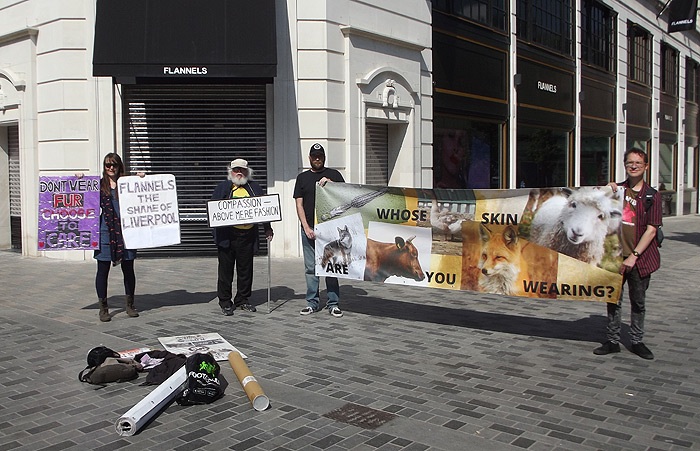Katy Brown of Merseyside Animal Rights reports
Protestors from Merseyside Animal Rights and other local animal protection groups gathered outside Flannels last Thursday, as it opened its new store in Clayton Square, to highlight a darker side to the fashion chain’s activities. Despite the fact that the farming of animals for their fur was banned in the UK back in 20021, Flannels continues to stock real animal fur in its stores from a range of species including foxes, minks, rabbits and coyotes.2 The company makes no secret of this, and even admit on its own website, that it uses fur from trapped wild animals.3
Every year some 10 million animals are trapped in the wild for their fur, caught by leghold traps, body grip traps (Conibear trap) and wire snares. These painful traps often break the animals’ bones – once caught they can spend days in agony before the traps are visited again by the trappers who set them.4
Flannels also sell items made from the fur of animals which are bred specifically for the industry, and thus are practically are born straight into the cage, to be killed later just for their fur. The fur industry has been exposed by many undercover investigation teams – each time extremely disturbing cruelty has been discovered including dirty conditions and poor welfare practices. Animals have often been found living squashed together in wire mesh cages where they can barely move and workers have also been caught routinely hitting, beating, throwing and stamping on animals.5
Crowds gathered towards midday for the official opening, those waiting were well informed of the horrors of the fur industry via leaflets, and as the doors opened to customers protestors shared information on the reality of what happens to animals trapped in the wild for their fur and on fur farms via megaphone.
Spokesperson Steve Moss from Merseyside Animal Rights said ‘there is no excuse for anyone selling real fur in this day and age, it’s 2022, not the dark ages. The fur industry is barbaric and cruel and has no place in a civilised society. The suffering the animals involved in the fur industry experience is very real and cannot be underestimated. Fur farming was banned in the UK for a reason – the majority of the public are against the farming of animals for their fur because it is morally unacceptable. We call on Flannels to examine its conscience and halt the sale of real animal fur immediately.’
Our protest met with an overwhelmingly positive response from the public who were horrified to learn that real fur is being sold in our city in 2022, thus vindicating the reason fur farming was banned in the first place – because the public find it morally unacceptable. It’s time that Flannels follows suit and in line with the majority of shops on our high streets issues a fur free policy.
If you want to get involve with campaigning against the fur trade and other animal rights issues please email us at merseysideanimalrights[at]lists.riseup.net or visit our website or Facebook page.
References
- Fur farming has been banned in England and Wales since 2000 and in Scotland and Northern Ireland since 2002. We also have restrictions on the import of fur from domestic cats and dogs, from commercial seal hunts, and from wild animals trapped for their fur.
- https://www.flannels.com/women/clothing/jackets-and-coats/fur-and-faux-fur
- https://help.flannels.com/en/support/solutions/articles/80000495474-fur-policy
- Trapping | Coalition to Abolish the Fur Trade (caft.org.uk)
Flannels clearly advertise that they sell real fur on their website:
Though the stock of fur items is currently reduced due to it being summer - Mink Farming | Coalition to Abolish the Fur Trade (caft.org.uk)
